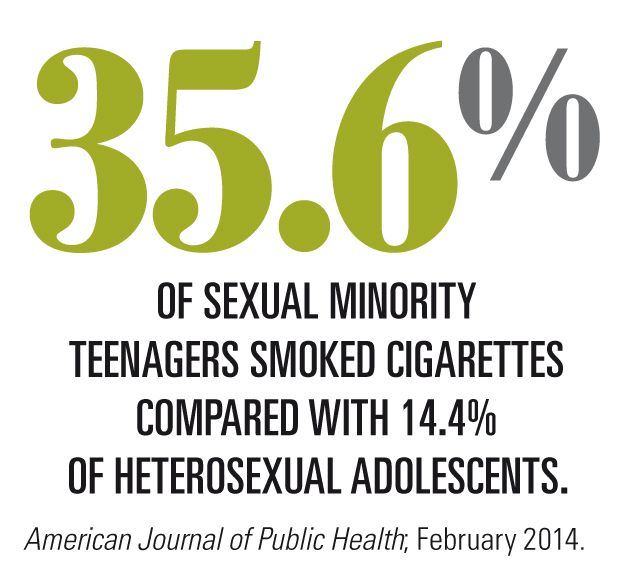Sexual minority adolescents take more behavioral risks than heterosexual peers
High school students who are sexual minorities are more likely to take risks that increase their chances of cancer than their heterosexual peers, almost across the board, according to an analysis of the Youth Risk Behavior Surveys (YRBS).
High school students who are sexual minorities are more likely to take risks that increase their chances of cancer than their heterosexual peers, almost across the board, according to an analysis of the Youth Risk Behavior Surveys (YRBS).
Sexual minority adolescents were more likely to take risks in behaviors such as use of tobacco, use of alcohol, binge drinking, early intercourse, no condom at last sexual intercourse, drug use at last intercourse, being overweight, purging, and little physical activity.

The only risk behavior that sexual minority adolescents reported less often than their heterosexual peers was eating a diet low in fruits and vegetables. That was a matter of 93.4% compared with 95.6% for heterosexuals, according the February American Journal of Public Health study, one of a collection of studies looking at sexual minorities.
For example, 35.6% of sexual minority teenagers smoked cigarettes compared with 14.4% of heterosexual adolescents. Also, 34.3% of sexual minority teenagers said they engaged in binge drinking compared with 22.1% of heterosexuals. Also among the sexual minorities, 32.7% were overweight compared with 27.2% of heterosexuals.
The researchers, including Margaret Rosario, PhD, with the department of psychology in the City University of New York, say cancer “undoubtedly increases as risk behaviors become part of the behavioral repertoire; are repeated over time; become habitual; and possibly influence the development of other cancer-related behaviors.”
The YRBS, sponsored by the Centers for Disease Control and Prevention (CDC), is conducted in US high schools. Some jurisdictions have added sexual orientation questions.
Another study using YRBS data was consistent with previous research in finding that sexual minorities report high levels of victimization, specifically: “Bisexuals and youths reporting partners of both sexes reported consistently high scores on indicators of victimization.”
A study by CDC researchers noted medically serious suicide attempts are perhaps the greatest indicator of future suicide. Among their findings, taken from YRBS data from 2002 to 2009 from each site with sexual orientation measures, were suggestions of higher risks of medically serious attempts among lesbians, bisexuals, and those with both-sex contact.
A YRBS study led by Harvard researchers found that 12.6% of high school students report rarely or never wearing a seat belt, but nonuse was 48% higher for male bisexuals compared with heterosexuals; 85% higher for lesbians; 46% higher for female bisexuals; and 51% higher for females who were unsure about their orientation.
In addition, a study led by a Columbia University investigator linked research on more than 20,000 people with the National Death Index and found that heterosexuals who report higher levels of antigay prejudice had a higher mortality risk, translating into roughly 2.5 fewer years of life expectancy. The researchers had asked questions including whether respondents would favor removing a book about homosexuality from their library and whether an admitted homosexual should be allowed to teach at a college or university.
The association was attenuated but still significant, the researchers said, after adjusting for sex, age, race/ethnicity, marital status, and nativity status.
Ms Foxhall is a freelance writer in the Washington, DC, area. She has nothing to disclose in regard to affiliations with or financial interests in any organizations that might have an interest in any part of this article.




















